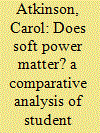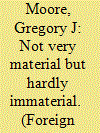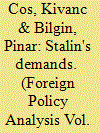| Srl | Item |
| 1 |
ID:
095593


|
|
|
|
|
| Publication |
2010.
|
| Summary/Abstract |
The decision to intervene in ongoing conflicts is one of the most difficult foreign policy choices states often face. Yet, studies of third parties' joining behavior have been rare and limited in several respects. First, they have explored only a subset of all interventions-military interventions. Second, they have concentrated on security-based determinants of intervention-power and alliance considerations-while underplaying other possible motivations behind the decision to intervene. Third, they have explored intervention and alignment choices as separate issues. This paper proposes a model of joining behavior that includes both security considerations and homophilous network ties as determinants of third parties' intervention and alignment choices. The model is tested on military and nonmilitary interventions data from Corbetta and Dixon (2005) for the 1946-2001 period. The results from a boolean logit estimation indicate that (1) the intervention decision is the result of both security-driven, pragmatic considerations and homophily between joiners and disputants; and (2) opposition to a party in a conflict is as important as a third party's social proximity to the side being supported.
|
|
|
|
|
|
|
|
|
|
|
|
|
|
|
|
| 2 |
ID:
095586


|
|
|
|
|
| Publication |
2010.
|
| Summary/Abstract |
Democratic governance depends not only on the building of democratic institutions but also on citizens' knowledge about how these institutions should function in their everyday lives. I argue that US-hosted educational exchange programs are one mechanism whereby citizens of nondemocratic states might experience life firsthand in a democratic country. Their experiences may impact the political institutions and influence political behavior in their home countries. In order for this process to take place, I argue that at least three contextual conditions are important: (i) the depth and extent of social interactions that occur while abroad, (ii) the sharing of a sense of community or common identity between participants and their hosts, and (iii) the attainment of a politically influential position by the exchange participant when they return home. In this article, I test these hypotheses and find support for what advocates of soft power often contend: US-hosted exchange programs can play an important role in the diffusion of liberal values and practices across the borders of authoritarian states.
|
|
|
|
|
|
|
|
|
|
|
|
|
|
|
|
| 3 |
ID:
095589


|
|
|
|
|
| Publication |
2010.
|
| Summary/Abstract |
In 1999 Sino-American relations experienced intense strain as a result of NATO's Kosovo intervention, and in particular by the bombing of the Chinese Embassy in Belgrade by an American B-2 bomber. Why did the bombing of China's embassy in Belgrade in the spring of 1999 touch such a raw nerve among the Chinese people and leadership? With the coming of the tenth anniversary of these events, what still needs to be explained is how Chinese and Americans could draw such divergent conclusions about that which they've never disagreed on-the incontestable fact of the embassy's demolition-and how the fact that what Americans called "a mistake" could almost completely derail Sino-American relations, which President Clinton in his very successful visit to China a year before had called a "strategic partnership." Based on a series of semistructured interviews the author did in Beijing and Washington with 28 Chinese and 30 American experts, this research draws a number of important conclusions in this regard. First, intensifying and even defining the conflict were a number of important perceptual gaps. Second, given the dispute over the intentionality of the embassy bombing, the conflict boiled down not to clashing interests, per se, but rather to issues of trust and beliefs about motives and intentions. Third, poor handling of the embassy bombing by both governments deepened the conflict and the alienation both sides felt. Fourth, underlying the lack of trust and the perceptual gaps between the two sides was "Fundamental Attribution Error.
|
|
|
|
|
|
|
|
|
|
|
|
|
|
|
|
| 4 |
ID:
095591


|
|
|
|
|
| Publication |
2010.
|
| Summary/Abstract |
Standard accounts on Turkey's foreign policy identify Molotov's communication of 1945 (better known as "Stalin's demands") as the catalyst behind Turkey's post-WWII decision to strain its relations with the USSR and turn to the United States (US) for defense support. The aim here is to complement these accounts which have stressed the military and ideological threat posed by the USSR as the catalyst behind Turkey's foreign policy change, by offering an analysis that explores the conditions of possibility for such change. The aim here is not to question the seriousness of the risks involved in failing to stand firm against the USSR in the immediate post-WWII period. Nor is it to dispute the appropriateness of Turkey's search for "Western" allies at a time when its economic, political and military vulnerabilities were acknowledged by friend and foe alike. The following mediates through accounts that stress the military threat and those that emphasize the ideological threat and presents an analysis that looks into the production of representations of the USSR as a "threat" to Turkey and the context which allowed for the production of such representations of the USSR.
|
|
|
|
|
|
|
|
|
|
|
|
|
|
|
|